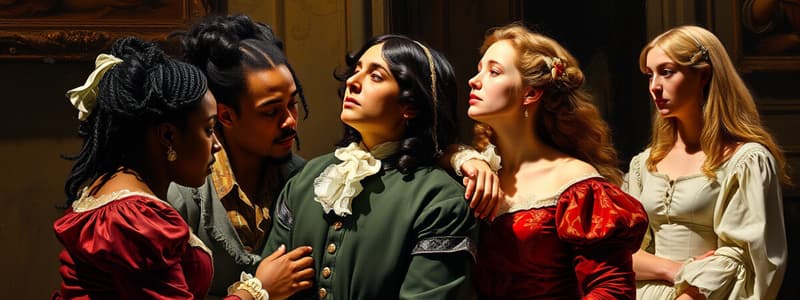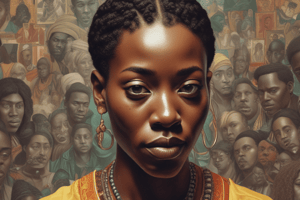Podcast
Questions and Answers
What is the main criticism of color-blind casting as discussed in relation to Hamilton?
What is the main criticism of color-blind casting as discussed in relation to Hamilton?
- It ignores the historical context of the roles. (correct)
- It focuses too much on the actors' race.
- It enhances the performance quality.
- It promotes racial equality.
How does the article differentiate between color-blind and color-conscious casting?
How does the article differentiate between color-blind and color-conscious casting?
- Color-blind casting judges performers strictly on skill, while color-conscious considers the social aspects of race. (correct)
- Color-blind casting is based on social standards while color-conscious is skill-based.
- Color-blind casting is influenced by traditional roles, whereas color-conscious casting disregards tradition.
- Color-blind casting considers race while color-conscious casting does not.
What does the editor suggest about the portrayal of historical figures in Hamilton?
What does the editor suggest about the portrayal of historical figures in Hamilton?
- It focuses on modern interpretations of these figures.
- They are represented accurately with no biases.
- BIPOC actors glorify historical oppressors. (correct)
- The story is based entirely on fictional characters.
What is one example provided that contrasts with Hamilton's casting choices?
What is one example provided that contrasts with Hamilton's casting choices?
What does the editor imply about future societal norms regarding race?
What does the editor imply about future societal norms regarding race?
What was a notable recent achievement mentioned in relation to representation in media?
What was a notable recent achievement mentioned in relation to representation in media?
What is the consequence of choosing BIPOC actors for roles of historical oppressors in Hamilton?
What is the consequence of choosing BIPOC actors for roles of historical oppressors in Hamilton?
According to the article, what does the term 'woke' imply in the context of Hamilton's production?
According to the article, what does the term 'woke' imply in the context of Hamilton's production?
What does James Hong emphasize as a need for storytelling in film?
What does James Hong emphasize as a need for storytelling in film?
What concern is raised about the musical representation of historical events?
What concern is raised about the musical representation of historical events?
What does the essay 'Who Lives, Who Dies, Who Tells Your Story?' analyze?
What does the essay 'Who Lives, Who Dies, Who Tells Your Story?' analyze?
How does the author describe the relationship between historical truth and historical fiction?
How does the author describe the relationship between historical truth and historical fiction?
What central issue does American democracy still face according to the content?
What central issue does American democracy still face according to the content?
What potential outcome does the author suggest the musical signals?
What potential outcome does the author suggest the musical signals?
What does the phrase 'the end of the end of history' imply?
What does the phrase 'the end of the end of history' imply?
How should historians respond to the audience's need for history?
How should historians respond to the audience's need for history?
What crucial aspect does the narrative of Hamilton respect in its audience?
What crucial aspect does the narrative of Hamilton respect in its audience?
What emotional impact does historical fiction like Hamilton aim to achieve?
What emotional impact does historical fiction like Hamilton aim to achieve?
What is the primary concern regarding the casting of BIPOC actors in traditionally White roles in Hamilton?
What is the primary concern regarding the casting of BIPOC actors in traditionally White roles in Hamilton?
How is color-blind casting described in relation to skill evaluation?
How is color-blind casting described in relation to skill evaluation?
What does the article identify as a significant difference between color-blind casting and color-conscious casting?
What does the article identify as a significant difference between color-blind casting and color-conscious casting?
What historical context does the casting in Hamilton create tension with?
What historical context does the casting in Hamilton create tension with?
What does the editor imply about the perception of color-conscious casting?
What does the editor imply about the perception of color-conscious casting?
Which sentiment is expressed about color-blind casting in the article?
Which sentiment is expressed about color-blind casting in the article?
What recent achievement is highlighted in the discussion of representation in media?
What recent achievement is highlighted in the discussion of representation in media?
What potential disadvantage of color-blind casting is discussed?
What potential disadvantage of color-blind casting is discussed?
What is the primary call to action regarding storytelling in relation to racial representation?
What is the primary call to action regarding storytelling in relation to racial representation?
What concern is associated with the musical's portrayal of historical events?
What concern is associated with the musical's portrayal of historical events?
What is highlighted as a potential benefit of historical fiction like Hamilton?
What is highlighted as a potential benefit of historical fiction like Hamilton?
What ongoing challenge does American democracy face as discussed?
What ongoing challenge does American democracy face as discussed?
What does the phrase 'the end of the end of history' suggest?
What does the phrase 'the end of the end of history' suggest?
What responsibility do historians have according to the content?
What responsibility do historians have according to the content?
How is Hamilton's appeal across the political spectrum explained?
How is Hamilton's appeal across the political spectrum explained?
What viewpoint does the author express about the potential simplification of historical narratives?
What viewpoint does the author express about the potential simplification of historical narratives?
What does the concept of 'Who Lives, Who Dies, Who Tells Your Story?' invite reflection on?
What does the concept of 'Who Lives, Who Dies, Who Tells Your Story?' invite reflection on?
What central idea does Hamilton explore regarding America's founders?
What central idea does Hamilton explore regarding America's founders?
What does color-conscious casting prioritize in its approach to selecting actors?
What does color-conscious casting prioritize in its approach to selecting actors?
How does the article characterize color-blind casting in relation to societal ideals?
How does the article characterize color-blind casting in relation to societal ideals?
What criticism is made concerning the use of BIPOC actors in Hamilton?
What criticism is made concerning the use of BIPOC actors in Hamilton?
What sentiment does the editor express about casting based on color-blind techniques?
What sentiment does the editor express about casting based on color-blind techniques?
What significant challenge does the casting choice in Hamilton highlight?
What significant challenge does the casting choice in Hamilton highlight?
What is one of the notable achievements that the article mentions in representation in media?
What is one of the notable achievements that the article mentions in representation in media?
How does the article implicitly suggest BIPOC performers are treated in Hamilton?
How does the article implicitly suggest BIPOC performers are treated in Hamilton?
What outcome does the article foresee as problematic for the future of societal norms related to race?
What outcome does the article foresee as problematic for the future of societal norms related to race?
What is suggested as a necessary change in storytelling according to James Hong's perspective?
What is suggested as a necessary change in storytelling according to James Hong's perspective?
How does the musical 'Hamilton' affect the perception of historical figures according to the discussion?
How does the musical 'Hamilton' affect the perception of historical figures according to the discussion?
What central dilemma does American democracy continue to confront as highlighted in the discussion?
What central dilemma does American democracy continue to confront as highlighted in the discussion?
In what way does the essay contrast historical fiction with traditional history narratives?
In what way does the essay contrast historical fiction with traditional history narratives?
What challenge regarding historical truth is indicated in the discussion about 'Hamilton'?
What challenge regarding historical truth is indicated in the discussion about 'Hamilton'?
What does the phrase 'Who Lives, Who Dies, Who Tells Your Story?' emphasize?
What does the phrase 'Who Lives, Who Dies, Who Tells Your Story?' emphasize?
What does the conclusion of the discussion suggest about the role of historians?
What does the conclusion of the discussion suggest about the role of historians?
How does the response to 'Hamilton' reflect on contemporary cultural issues?
How does the response to 'Hamilton' reflect on contemporary cultural issues?
What aspect of American history does the discussion critique through the representation in 'Hamilton'?
What aspect of American history does the discussion critique through the representation in 'Hamilton'?
What is implied about the audience's expectations regarding historical narratives?
What is implied about the audience's expectations regarding historical narratives?
Flashcards are hidden until you start studying
Study Notes
Hamilton and Color-Blind vs. Color-Conscious Casting
- Hamilton features BIPOC actors portraying traditional White roles of America's founding fathers, a significant shift in casting norms.
- Critics commend this choice but draw attention to the difference between color-blind and color-conscious casting.
- Color-blind casting evaluates actors solely on talent, disregarding race, while color-conscious casting considers contemporary social standards.
Impact of Color-Conscious Casting
- The editorial criticizes the color-conscious approach in Hamilton, emphasizing it may inadvertently glorify historical oppressors while sidelining the experiences of BIPOC artists.
- Casting BIPOC actors for roles of historical White figures without addressing the oppressive histories can be seen as problematic and reductive.
Calls for Story Diversification
- There is a push for more narratives centered on minority experiences rather than BIPOC actors filling traditionally White roles.
- Historical narratives often favored White perspectives, necessitating a broader inclusion of narratives that amplify minority voices.
Concerns about Historical Distortion
- Hamilton has been critiqued for simplifying complex historical figures and events into a binary of heroes and villains.
- This simplification may distort historical realities and gloss over the multifaceted nature of historical figures and events.
The Role of Historical Fiction
- The essay "Who Lives, Who Dies, Who Tells Your Story?" discusses the blurred line between historical truth and fiction, arguing that Hamilton reflects contemporary concerns about identity and belonging.
- Historical fiction often conveys universal themes of freedom and equality while celebrating the transformative nature of human action.
Historical Reflection and Cultural Significance
- Hamilton resonates across political lines due to its discussion of both the heroes and flaws of America's founders.
- It raises essential questions about reconciling minority claims for justice within a democratic framework.
- The musical, while not a solution to historical injustices, signals potential cultural shifts and the imagination of a better future.
The Role of Historians
- Historians have a duty to maintain an understanding of history that doesn’t constantly fixate on present issues but instead offers depth and broader perspectives.
- The narrative of who tells the story is crucial, suggesting that representation in storytelling matters significantly.
Hamilton and Color-Blind vs. Color-Conscious Casting
- Hamilton features BIPOC actors portraying traditional White roles of America's founding fathers, a significant shift in casting norms.
- Critics commend this choice but draw attention to the difference between color-blind and color-conscious casting.
- Color-blind casting evaluates actors solely on talent, disregarding race, while color-conscious casting considers contemporary social standards.
Impact of Color-Conscious Casting
- The editorial criticizes the color-conscious approach in Hamilton, emphasizing it may inadvertently glorify historical oppressors while sidelining the experiences of BIPOC artists.
- Casting BIPOC actors for roles of historical White figures without addressing the oppressive histories can be seen as problematic and reductive.
Calls for Story Diversification
- There is a push for more narratives centered on minority experiences rather than BIPOC actors filling traditionally White roles.
- Historical narratives often favored White perspectives, necessitating a broader inclusion of narratives that amplify minority voices.
Concerns about Historical Distortion
- Hamilton has been critiqued for simplifying complex historical figures and events into a binary of heroes and villains.
- This simplification may distort historical realities and gloss over the multifaceted nature of historical figures and events.
The Role of Historical Fiction
- The essay "Who Lives, Who Dies, Who Tells Your Story?" discusses the blurred line between historical truth and fiction, arguing that Hamilton reflects contemporary concerns about identity and belonging.
- Historical fiction often conveys universal themes of freedom and equality while celebrating the transformative nature of human action.
Historical Reflection and Cultural Significance
- Hamilton resonates across political lines due to its discussion of both the heroes and flaws of America's founders.
- It raises essential questions about reconciling minority claims for justice within a democratic framework.
- The musical, while not a solution to historical injustices, signals potential cultural shifts and the imagination of a better future.
The Role of Historians
- Historians have a duty to maintain an understanding of history that doesn’t constantly fixate on present issues but instead offers depth and broader perspectives.
- The narrative of who tells the story is crucial, suggesting that representation in storytelling matters significantly.
Hamilton and Color-Blind vs. Color-Conscious Casting
- Hamilton features BIPOC actors portraying traditional White roles of America's founding fathers, a significant shift in casting norms.
- Critics commend this choice but draw attention to the difference between color-blind and color-conscious casting.
- Color-blind casting evaluates actors solely on talent, disregarding race, while color-conscious casting considers contemporary social standards.
Impact of Color-Conscious Casting
- The editorial criticizes the color-conscious approach in Hamilton, emphasizing it may inadvertently glorify historical oppressors while sidelining the experiences of BIPOC artists.
- Casting BIPOC actors for roles of historical White figures without addressing the oppressive histories can be seen as problematic and reductive.
Calls for Story Diversification
- There is a push for more narratives centered on minority experiences rather than BIPOC actors filling traditionally White roles.
- Historical narratives often favored White perspectives, necessitating a broader inclusion of narratives that amplify minority voices.
Concerns about Historical Distortion
- Hamilton has been critiqued for simplifying complex historical figures and events into a binary of heroes and villains.
- This simplification may distort historical realities and gloss over the multifaceted nature of historical figures and events.
The Role of Historical Fiction
- The essay "Who Lives, Who Dies, Who Tells Your Story?" discusses the blurred line between historical truth and fiction, arguing that Hamilton reflects contemporary concerns about identity and belonging.
- Historical fiction often conveys universal themes of freedom and equality while celebrating the transformative nature of human action.
Historical Reflection and Cultural Significance
- Hamilton resonates across political lines due to its discussion of both the heroes and flaws of America's founders.
- It raises essential questions about reconciling minority claims for justice within a democratic framework.
- The musical, while not a solution to historical injustices, signals potential cultural shifts and the imagination of a better future.
The Role of Historians
- Historians have a duty to maintain an understanding of history that doesn’t constantly fixate on present issues but instead offers depth and broader perspectives.
- The narrative of who tells the story is crucial, suggesting that representation in storytelling matters significantly.
Studying That Suits You
Use AI to generate personalized quizzes and flashcards to suit your learning preferences.




